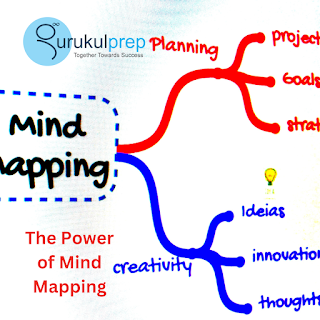In this blog, we will discuss the power of mind mapping—a dynamic tool that can revolutionise how we learn, organise information, and supercharge our memory.
Imagine your mind as a vast and intricate landscape filled with thoughts, ideas, and knowledge waiting to be unlocked. Now, envision mind mapping as the key to unravelling this treasure trove, transforming it into a visual masterpiece of connections and insights.
A mind map is a radiant network of ideas radiating from a central concept, like branches on a tree. This central concept could be a subject, a project, or even a simple thought. From this nucleus, branches extend outward, each representing a subtopic, a detail, or a related idea. It's a structure that mirrors how our brains naturally organise information—making it an extraordinarily effective tool for learning.
Mind mapping is remarkable in its ability to capture the essence of information in a single glance. Instead of sifting through a sea of linear notes, mind maps offer clarity and coherence. They present information in a format that our brains inherently understand—visually. This visual representation makes it easier to grasp complex concepts, recognise patterns, and remember critical details.
Consider a mind map as the GPS for your brain. Just as a GPS provides a clear route to your destination, a mind map offers a clear path to understanding. It bridges the gap between the abstract and the concrete, making complex ideas tangible and understandable.
Moreover, mind mapping encourages creativity. As you create a mind map, your brain engages in divergent thinking—exploring multiple perspectives, associations, and possibilities. This divergent thinking enhances your understanding of a topic and fosters creative solutions to problems.
But the true magic of mind mapping lies in its ability to foster connections. Think of it as a digital neural network for your thoughts. It lets you see the interrelationships between ideas, helping you connect the dots between seemingly disparate concepts. These connections enhance your comprehension and retention of information, turning isolated facts into a web of knowledge.
Now, let's talk about memory. Memory is like a muscle that needs regular exercise to stay strong. Mind mapping is the perfect workout for your memory. You actively review and reinforce the information when you engage with a mind map. Mind maps' visual and spatial elements act as memory triggers, making it easier to recall details when needed.
In the age of information overload, where textbooks and screens bombard us with data, mind mapping offers a sanctuary of clarity. It empowers us to take charge of our learning journey, to organise information in a way that makes sense to us, and to retain it for the long haul.
In conclusion, mind mapping is not merely a tool; it's a beacon of hope for learners, a guiding light through the labyrinth of knowledge. It enables us to organise, connect, and remember information like never before. So, embrace the power of mind mapping, and let your mind's potential shine brighter than ever. It's a journey that promises knowledge, understanding, creativity, and limitless possibilities.


